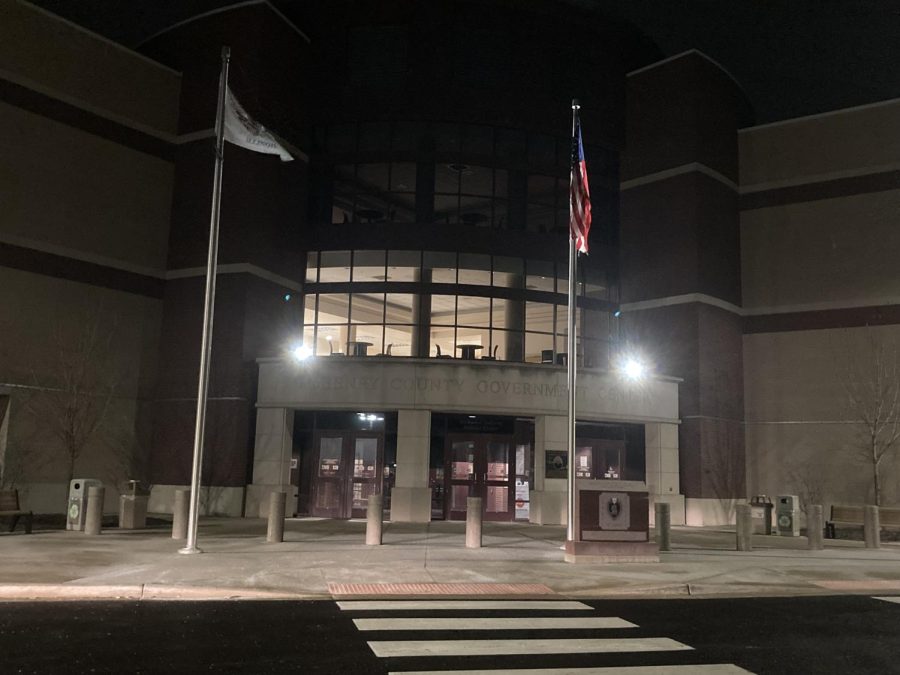The state’s attorney
January 17, 2023
The McHenry County Government Center in Woodstock houses the county courthouse where the Illinois States Attorney has filed a lawsuit against Walgreens and CVS.
The McHenry County State’s Attorney office first noticed opioid-related deaths skyrocket in 2017. Upholding public safety, the office implemented policies to hold drug dealers and those who share drugs accountable that same year.
“We became the most aggressive county in the country with prosecuting drug-induced homicide,” Assistant State’s Attorney Brian Miller, who supervises drug prosecutions, said. “That’s part of the approach we’ve taken locally.”
Almost six years later, McHenry County continues to track several opioid-related deaths and overdoses each month. Attempting to get accountability, State’s Attorney Patrick Kenneally filed a lawsuit this August against pharmaceutical companies for their alleged role in the epidemic. We joined [the lawsuit] because the opioid epidemic … is not just a far-away problem. It’s a problem that’s hit close to home here in McHenry. — Assistant State's Attorney Brian Miller
“Particularly, we joined [the lawsuit] because the opioid epidemic … is not just a far-away problem,” Miller explained. “It’s a problem that’s hit close to home here in McHenry.”
The original lawsuit aims to hold opioid manufacturers and distributors accountable for profiting off medications in a way that contributed to the United States’ growing opioid epidemic. Specifically, it claims there was little oversight and regulation when filling opioid prescriptions.
“That’s not the sole cause of the opioid epidemic by any means,” Miller said. “It’s a multifaceted problem with many causes. We’re trying to address [it] as best as we can, so this is just one way we’re fighting [for] accountability.”
Pharmaceutical companies could not comment on their practices due to pending litigation.
Miller added that several lawsuits against Walgreens, Walmart, CVS and other big-name pharmacies are still ongoing. McHenry County has had previous success in one of these opioid-related suits.
“There’s a massive settlement … in which McHenry County got approximately 3.4 million dollars,” he said. “Although, that’s paid out over the years, so [immediate] compensation is somewhat smaller.”
Meanwhile, the State’s Attorney Office continues a multifaceted response to the epidemic. McHenry County works closely with the Substance Abuse Coalition and other community-based organizations to brainstorm ways to combat the crisis.
“We’ve also implemented, to the best of our ability, strict terms to probation for addicts — requiring drug tests weekly, in addition to rehab or other monitoring,” Miller added. “We really want to be involved; we need to keep a close leash. Opioid addiction is very, very hard to overcome.” In our experience, people have not willingly gotten the help they need. Some do. But, people get into treatment because there’s the penalty of incarceration.” — Assistant State's Attorney Brian Miller
Unprecedented challenges along the way include Illinois’ proposed House Bill 3447. The bill would make possessing specified amounts of opioids and other drugs Class A misdemeanors instead of felonies if passed.
“Our office is opposed to it,” Miller said. “I don’t want to speak completely on behalf of Mr. Kenneally, but I will say that we don’t see that removing penalties for drug possession is going to help addicts in any way.”
He added that the potential of a felony functions as a deterrent to keep individuals from using or selling opioids. Felonies come with prison time and hefty fines. In contrast, misdemeanors typically come with a fine not exceeding $2,500.
“In our experience, people have not willingly gotten the help they need,” Miller said. “Some do. But, people get into treatment because there’s the penalty of incarceration.”
Though there are challenges, the State’s Attorney Office constantly brainstorms and discusses appropriate responses to help those with substance use struggles.
“I can say that our office is very sympathetic to the tragedies that occur in our community with regards to drug addiction and overdoses,” Miller said. “We don’t get it right every time, but … we’re trying our best to make a difference, fully acknowledging that the solution is not going to end with our office.”
